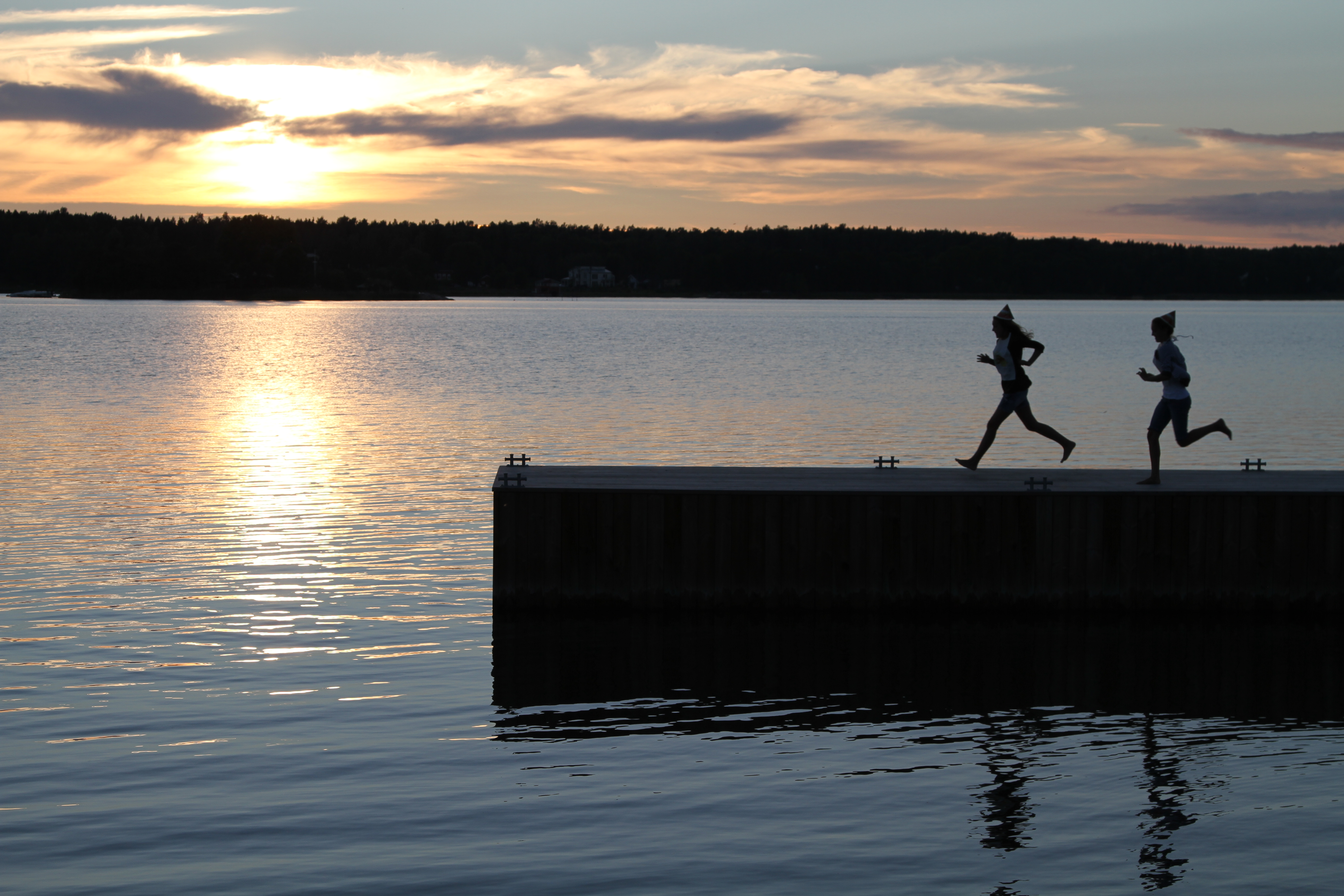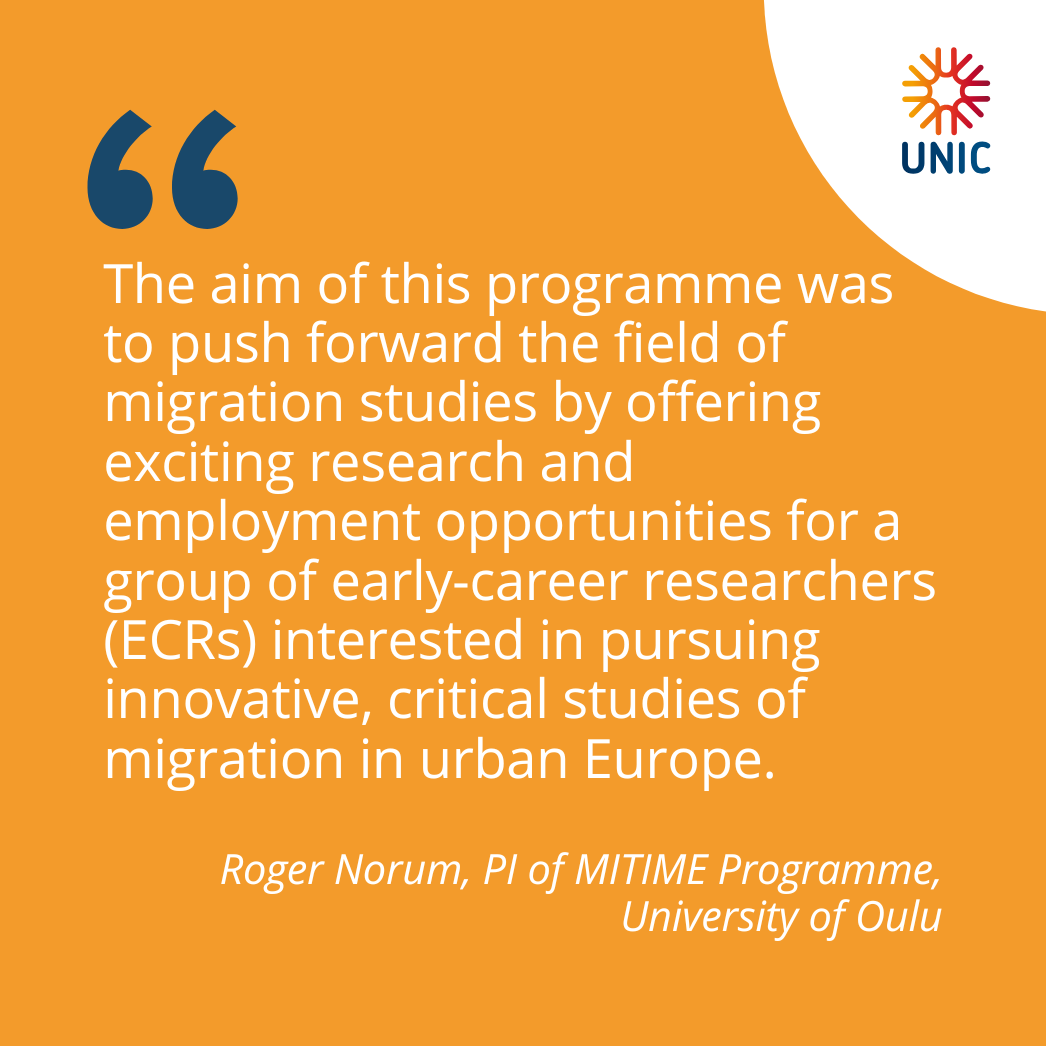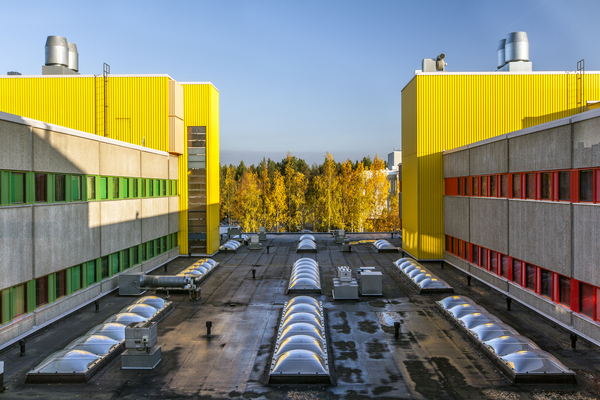The UNIC website uses cookies to improve your experience. Read our full Cookie Policy here.

The consortium brings together seven UNIC universities and ten civil society partners to challenge conventional understandings of human mobility, and underscores UNIC’s position as a leading European hub for research and doctoral education in the field of migration and mobility studies.
To understand more about the programme, and its origins, UNIC spoke to Associate Professor Roger Norum, the programme’s Principal Investigator. This interview has been edited for clarity:
Could you tell us more about what MITIME is, and the issues it addresses?
MITIME (“Entanglements of Migration and Time in Post-industrial Urban Europe”) is a new interdisciplinary doctoral programme which focuses on Europe’s most critical socio-political hotpoint today: migration. Funded by the Marie Skłodowska-Curie Actions Doctoral Networks Call, the programme will fund 15 new doctoral researchers and give them important cross-sectoral, transversal and interdisciplinary skills for studying critical issues around migration, integration and societal change currently faced by European cities. The aim of the training programme is to stimulate the doctoral researchers’ creativity, augment their innovation capacities and enhance their employability in and beyond the academy.
Partnering with seven UNIC universities and ten civil society partners, MITIME challenges conventional understandings of human mobility, which typically see migratory processes as linear trajectories—from departure to journey to arrival to settlement. The programme seeks to show that normative, narrowly framed conceptualisations of how people move cannot effectively capture the diversified patterns of migration and integration that typify how people actually move to and within in Europe today. MITIME uses the critical lens of temporality as a means of bringing new, disruptive insights to existing understandings of mobility and diversity in post-industrial European cities, spaces in which socio-economic inequalities have grown deeper in the transition out of the industrial era, driven by structural changes in the global economy. It generates innovative approaches and methods for researching and supporting social inclusion and for combatting inequalities and injustices, using five core frames of study: connectivities; labour; placemaking; narrative; and governance.
MITIME will allow us to train a new generation of migration experts to use cutting-edge research methods, interdisciplinary theories and novel forms of societal engagement.

How does it feel to be awarded this funding?
It feels very special for this consortium to finally have been awarded funding from Horizon Europe. But this is not something that came about overnight, nor did it emerge from a single initiative. The initial idea for this training network emerged in early 2022 between several Bochum-based colleagues, Ludger Pries and Margit Fauser, who invited Johanna Leinonen and myself to brainstorm paths forward for organizing a doctoral training and research consortium around the topic of European migration. The aim was to build on the work that UNIC has been spearheading to mobilize research-based teaching about pressing societal issues in urban spaces. MITIME’s specific focus, aligning migration with temporality, taps into something of a zeitgeist in social science research that considers what notions, imaginaries and practices of time do to our societies and cultures. Developing and writing the multiple funding proposals involved an intensive process over nearly three years, with invaluable contributions from many people, including Taina Cooke and our six UNIC partners. Now that the programme is kicking into gear, my colleagues in anthropology Élise Lépy and Bruno Lefort are joining me to strengthen the vision and leadership which MITIME deserves.
From the beginning, the aim of this programme was to push forward the field of migration studies by offering exciting research and employment opportunities for a group of early-career researchers (ECRs) interested in pursuing innovative, critical studies of migration in urban Europe. But rather than senior researchers imposing their own ideas about what research on migration today should look like, the aim of this kind of programme is that the real ideas come from the ECRs themselves.
Following numerous rewrites, extensive critical feedback from external consultants, and two formal proposal submissions (in 2022 and 2024), the EC finally granted funding to the consortium to the tune of around EUR 4.4 million. I think that the award really reinforces the importance of seeing rejection as an opportunity, taking on feedback, rethinking your ideas, and simply continuing to apply and reapply to take advantage of fertile funding opportunities. It is a testament to the perseverance and the agility of the Oulu research community, and to the University’s support of scientists who want to pursue out-of-the-box ideas – whether for their own individual research projects or for initiatives that strengthen the broader community.
It was a very competitive call this year, with 1,417 proposals submitted, which is nearly 50% higher than the previous year. And only a small percentage of these (13%) were funded. What did we do right at the university to have won such a major project, and what are our strengths in how we work?
MITIME will be the first MSCA Doctoral Network to be coordinated by the University of Oulu. The success of this award highlights the importance of assembling the right people, institutions, and scientific approaches for writing competitive funding applications. I think that the University is currently making excellent steps towards building strong, transdisciplinary collaborations, particularly through its active Centers for Multidisciplinary Research (CMR) and its Profiling Area programmes. One aim of these University programmes, such as Eudaimonia and Biodiverse Anthropocenes—two that I am closely involved in—is to scan faculties and programmes for promising, emerging ideas to identify potential synergistic topics and researchers for new collaborative research and funding applications. This is something that has been happening for a while at the University but I think can be made more systematic by developing the activities and initiatives which the CMRs use to engage with both senior researchers and doctoral researchers.
To my mind, MITIME’s success reflects this careful, care-full approach to encouraging, supporting and doing research. Securing major European consortium funding like this requires strategic thinking, the ability to juggle multiple priorities, and a commitment to academic work that combines scientific excellence with real-world impact. And it is clear that this kind of work can only be successfully done by engaging diverse disciplines, institutions, scientists, and stakeholders. But it also needs a commitment to wanting to build something, to generate a research community that is really more than the sum of its parts. This funding gives us a rare opportunity to do just that—to help shape the next generation of migration scholars and to find ways to encourage innovative research about mobility. This could enable a tangible impact on how human mobility and the migration experience is imagined, perceived, understood and addressed in Europe.
 MITIME will be the first MSCA Doctoral Network to be coordinated by the University of Oulu.
MITIME will be the first MSCA Doctoral Network to be coordinated by the University of Oulu.
One of Oulu's key strengths is how we approach research collaboration—not just as an institutional exercise but as a deeply personal and relational one. The best consortiums are not just names on a funding proposal; behind those names stand meaningful, long-term partnerships with individuals across disciplines and sectors who take real responsibility for their contributions. In MITIME, we bring together seven leading universities—in Bilbao, Bochum, Cork, Istanbul, Liège, Oulu, and Rotterdam—that are actively engaged in research on migration from multiple disciplinary perspectives: political science, sociology, anthropology, policy studies, education, economics and cultural and media studies. We have also included the participation of ten societal partners, whose involvement give the programme unique perspectives and expertise on the practical, everyday lived confluence of migration and temporality.
That said, the time required to build these partnerships doesn't always align with the rigid temporalities of funding cycles, which often demand quick thinking, swift sign-offs, immediate community buy-in, and sped-up research outputs. The only way to work effectively to incubate and germinate these kinds of transformative institutional connections is to invest in human relationships. That means taking the time to get to know your partners, meeting them in person, inviting them out for a coffee (or an Irish coffee), cooping up with them in a room for several days to think and talk and write, and building trust that goes beyond mere academic collaboration. In this sense, the slower, more deliberate and paced Finnish approach to social interaction—where it can take some real time for people to build connections to one another—is one advantage here. There are already vibrant movements out there such as Slow Food, Slow Travel, Cittaslow (Slow Cities); perhaps Slow Collaboration, Slow Research, or Slow Thinking might be best practices that Oulu could harness to push forth effective ways for forming and leading scientific consortia.
What does this mean for the university, and what could it lead to?
Winning this MSCA Doctoral Network funding will really strengthen the University of Oulu's position as a leading European hub for research and doctoral training in the anthropology of migration and mobility. It will enhance our international partnerships, help us attract top-tier doctoral candidates, and allow us to legitimately deepen our engagement with policymakers and civil society. More broadly, it raises the university's profile in shaping conversations on migration, integration, and the many diversities and inequalities implicit in urban transformation. This kind of success also lays the groundwork for future large-scale research collaborations and funding opportunities, which embed Oulu more firmly within key European research and policy networks. It also brings us into closer contact with our UNIC partners.
How do we move forward with this work? Does winning this project change how we operate?
Winning MITIME moves us into a critical phase in working on migration research at Oulu. Later this year, we will begin to recruit doctoral researchers, design MITIME’s innovative training programs, and co-develop novel research projects. The programme also requires us to commit to further strengthening our collaborations with non-academic partners in order to ensure that research is deeply embedded in real-world challenges.
The transdisciplinary, cross-sectoral training model that MITIME will deploy could also inform future doctoral education processes at our university, making this a long-term investment in how we train scholars and practitioners. I hope that MITIME's success will encourage colleagues to consider spearheading coordinating consortia and submitting applications for these rich funding opportunities. They bring real value to a university's future because they do not just fund research; they secure multiple well-funded opportunities to train and champion doctoral researchers, who are—let’s be honest here—really the future of scientific innovation and creativity at our institution.
The next strategic step I think will be to brainstorm a plan for building a larger cross-faculty programme at the university, one which focuses on the multiple concepts, methods, forms, processes, and practices of migration and mobility. But maybe that is something to think about tomorrow.
Learn more about MITIME at the University of Oulu’s website here.
Watch this space for open calls and future announcements from MITIME.
Photo Credit: Roger Norum
New interdisciplinary UNIC PhD Programme MITIME focuses on mobility, m...
Migration is one of Europe’s most critical socio-political issues. Yet much research views the...
12 May 2025
Read more »Meet the Winners of the Inaugural UNIC Best Paper and Best CityLab Awa...
UNIC is delighted to announce the winners of our inaugural UNIC Best Paper and Best CityLab Aw...
09 May 2025
Read more »Visiting the Arctic Silicon Valley in Oulu, Finland
A reflection on UNIC collaboration by Wim Hulsink and Rene Olie of the Rotterdam School of Man...
17 Apr 2025
Read more »